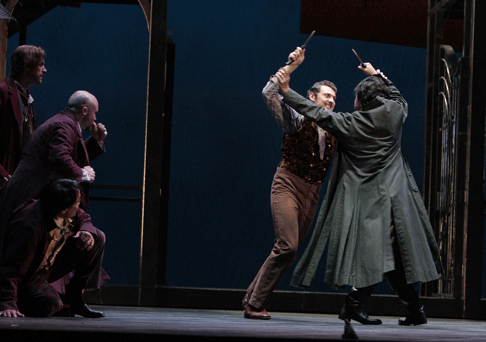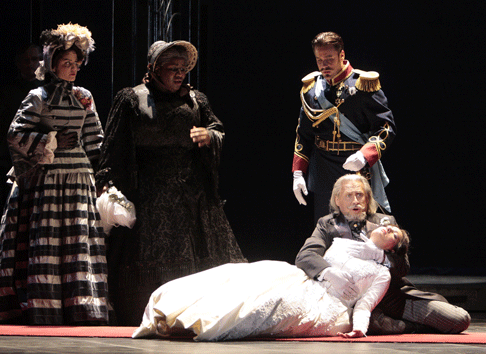09 Nov 2011
Roméo et Juliette, LA
Love and gloom at the Los Angeles Opera.

Love and gloom at the Los Angeles Opera.
Though love and gloom permeate Gounod’s Roméo and Juliette — the opera opens with a melancholy choral prologue and ends with a tear provoking death duet — it was love that won the day when the curtain came down at the opera’s November 6th opening performance at the Dorothy Chandler Pavilion. But this was not the love of the young protagonists for each other, rather it was that of the audience for the opera, its principle performers, and its conductor Placido Domingo. The moment the curtain fell, applause overwhelmed the last orchestral sounds. And the instant it rose again to reveal the singers and set, bodies shot forth from their seats as one.
The current production is a revival of the 2005 presentation of the work directed by Ian Judge. As it did six years ago, Roméo and Juliette brought together two young singers at the thresholds of their operatic careers, Georgian soprano, Nino Machaidze, and Italian tenor, Vittorio Grigolo. More about them in a moment.
Shakespeare’s play, shaped for Gounod by librettists Jules Barbier and Michel Carré into five acts that focus exclusively on the lovers, gave the composer abundant opportunity write music filled with love and with dread. When it was produced in Paris in 1867, the work immediately won the hearts of French audiences. Its first Metropolitan Opera performances in 1884 were sung in Italian. Its reappearance in the Met repertory at an 1891 performance in Chicago marked the first time the company sang a French opera in French. It was as quickly a success here as well, and why not? Those early performances featured the De Reszke brothers and Emma Eames.
Who knows what the De Reszkes and Mme. Eames, swathed in their their multilayered costumes would have made of this slick production delivered in two acts, featuring slim young lovers romping in bed half nude, and set nowhere in particular? The essentially unit set with movable sections, is a skeletal iron structure which recalls old Parisian arcades, or the base of Eiffel Tower. However, the set changes were fairly rapid and effective. Costumes were dark and restrained. The beautifully constructed gowns for the First Act ball never lit the scene, perhaps to help us keep us in mind of impending doom. My major grievance relates to the direction after Mercutio’s death. Ian Judge has our hero fighting dirty. After hand to hand pushing and shoving and a brief duel with knives, Romeo suddenly has a gun in his hand and unhesitatingly shoots Tybalt point blank. If you heard someone exclaim. “that’s that not fair,” you were sitting near me.
 Alexey Sayapin as Tybalt and Museop Kim as Mercutio
Alexey Sayapin as Tybalt and Museop Kim as Mercutio
Neither Machaidze or Grigolo, who was making his LA debut, is new to French opera. The soprano was Juliet in Salzburg in 2008 and in Verona this past July. She and Grigolo performed their roles together in June at La Scala. Grigolo has also sung Hoffmann and scored an enormous success as Des Grieux in his Covent Garden debut.
Machaidze was a charming Juliet, though her voice, noticeably edgier than in her Salzburg Juliet, was occasionally shrill at the top. Grigolo, known in his youth in Italy as il Pavarottini, has a dark robust almost baritonal voice with a gravelly buzz in mid range that opens to a clarion clarity at the top. Slim and handsome, he is also remarkably agile and scaled the gates and ladders keeping him from his beloved with the litheness of a cat burglar.
 Vladimir Chernov as Capulet and Nino Machaidze as Juliette, with Ronnita Nicole Miller (in black) as Juliette's Nurse, and Daniel Armstrong (at right, in rear) as Count Paris
Vladimir Chernov as Capulet and Nino Machaidze as Juliette, with Ronnita Nicole Miller (in black) as Juliette's Nurse, and Daniel Armstrong (at right, in rear) as Count Paris
Museup Kim as Mercutio and Renée Rapier, making an unexpected LA opera debut as Stephano, were outstanding in this large cast. Vitalij Kowaljow was a sonorous Friar Laurence. Alexey Sayapin debuted as Tybalt. Baritone Vladimir Chernov sang the thankless role of Count Capulet, and Ronnita Nicole Miller had little to sing about as Juliette’s nurse.
Maestro Domingo’s conducting, while responsive to Gounod’s long melodic lines, whether instrumental or vocal, lacked the rhythmic thrust that keeps a repeated waltz beat buoyant. Perhaps his rehearsal time was limited. But no one cared. With the production staff, performers, conductor and chorus on stage, and the energetic Grigolo pulling them forward for yet another bow, all was love Sunday afternoon at the Los Angeles opera.
Estelle Gilson